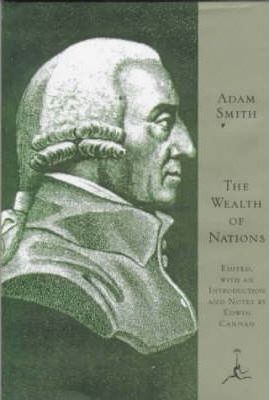The Wealth of Nations

The Wealth of Nations
First published in 1776, The Wealth of Nations is generally regarded as the foundation of contemporary economic thought. Adam Smith, a Scottish professor of moral philosophy, expounded the then-revolutionary doctrine of economic liberalism. The book's importance was immediately recognized by Smith's peers, and later economists have shown an unusual consensus in their admiration for his ideas.
Combining economics, political theory, history, philosophy, and practical programs, Smith assumes that human self-interest is the basic psychological drive behind economics and that a natural order in the universe makes all the individual, self-interested strivings add up to the social good. His conclusion, that the best program is to leave the economic process alone and that government is useful only as an agent to preserve order and to perform routine functions, is now known as laissez-faire economics or noninterventionism. In noting for the first time the significance of the division of labor and by stating the hypothesis that a commodity's value correlates to its labor input, Smith anticipated the writings of Karl Marx. Like Marx's Das Capital and Machiavelli's The Prince, his great book marked the dawning of a new historical epoch.PRP: 252.00 Lei
Acesta este Prețul Recomandat de Producător. Prețul de vânzare al produsului este afișat mai jos.
226.80Lei
226.80Lei
252.00 LeiLivrare in 2-4 saptamani
Descrierea produsului
First published in 1776, The Wealth of Nations is generally regarded as the foundation of contemporary economic thought. Adam Smith, a Scottish professor of moral philosophy, expounded the then-revolutionary doctrine of economic liberalism. The book's importance was immediately recognized by Smith's peers, and later economists have shown an unusual consensus in their admiration for his ideas.
Combining economics, political theory, history, philosophy, and practical programs, Smith assumes that human self-interest is the basic psychological drive behind economics and that a natural order in the universe makes all the individual, self-interested strivings add up to the social good. His conclusion, that the best program is to leave the economic process alone and that government is useful only as an agent to preserve order and to perform routine functions, is now known as laissez-faire economics or noninterventionism. In noting for the first time the significance of the division of labor and by stating the hypothesis that a commodity's value correlates to its labor input, Smith anticipated the writings of Karl Marx. Like Marx's Das Capital and Machiavelli's The Prince, his great book marked the dawning of a new historical epoch.Detaliile produsului










